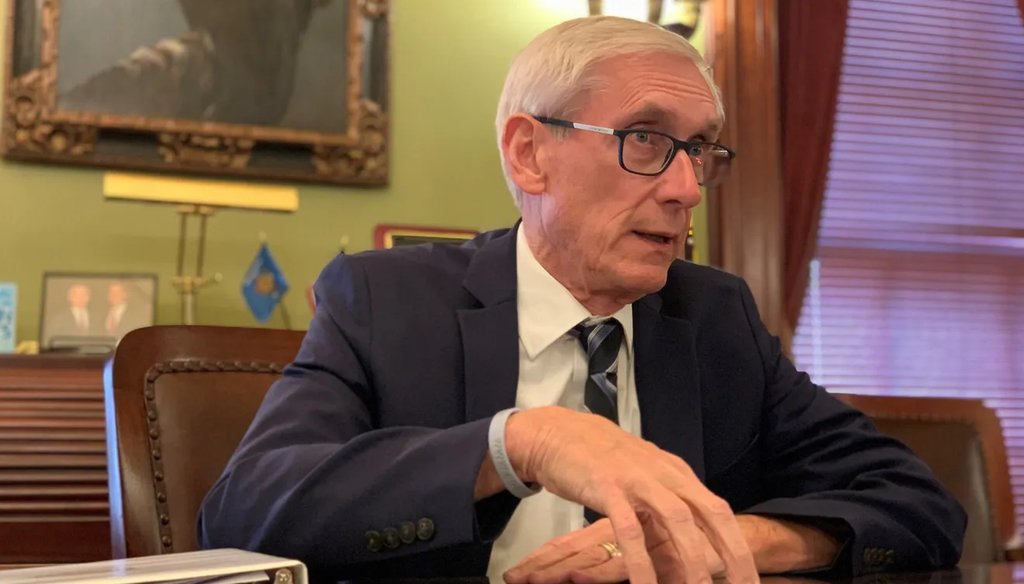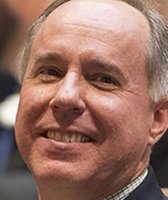Get PolitiFact in your inbox.

Gov. Tony Evers has granted more pardons than any Wisconsin governor in contemporary history. (Molly Beck / Milwaukee Journal Sentinel.)
With Wisconsin’s gubernatorial race approaching, PolitiFact Wisconsin has been taking a look at how Gov. Tony Evers has fared on some of his first-term campaign promises.
We use the Evers-O-Meter to track progress on promises Evers made as a candidate in 2018. Like the Walk-O-Meter before it, which tracked Republican Scott Walker’s promises, we assign ratings based on outcomes, not intent or effort on the part of Evers – a Democrat who has faced a Republican-held Legislature.
In other words, we’re taking a bottom-line look at whether promises were accomplished in the timeframe set — typically that’s the first term, but in some cases Evers noted at the time fulfilling the promises would take longer.
We assign ratings based on the status of the promise: In the Works, Stalled, Compromise, Promise Kept or Promise Broken. On July 5, 2022, we updated six of the governor’s promises. Here is a look at an additional five promises we recently rated.
1. Protect coverage for pre-existing conditions.
On the campaign trail in 2018, Evers pledged to extend protections for pre-existing conditions, saying half of Wisconsinites have some kind of pre-existing health condition.
With a divided state government, that wasn’t a simple task, and in May 2019 we rated this promise Stalled. At the time, the Assembly had passed a bill that it said would protect pre-existing conditions, but Evers was skeptical of how it was constructed.
With the 2022 election approaching, Evers spokesperson Britt Cudaback could not point to any particular results on this front. Instead, she told us via email that the governor is "committed to signing a bill to protect coverage for pre-existing conditions — Republicans in the Legislature have since abandoned their effort to pass such legislation and have not sent such a bill to the governor."
We continue to rate this promise Stalled.
2. Bolster preventive health programs that have been defunded
In both of his two-year budgets, Evers proposed funding for a variety of programs aimed at keeping this promise. But Republicans rejected the vast majority of the governor’s proposals to expand preventive healthcare and women’s health care and address racial disparities.
Nevertheless, Evers was able to direct some federal COVID-19 relief money to such programs. (The governor was able to distribute that money on his own, without approval from the GOP-held Legislature.)
For example, two grant programs announced March 30, 2022, funded at $5 million each, are intended to expand access to mental health services for children and making telehealth appointments easier to access for people without reliable home internet.
And, as we reported on March 25, 2022, Evers gave Planned Parenthood of Wisconsin $2.4 million in COVID relief money. It was earmarked for services aimed at supporting organizations that work to eliminate disparities in health, child development, education and other areas, not to pay for abortions, the organization said.
Of that amount, $1.4 million was split between individual clinics and about $1 million was given to the broader statewide organization.
Funding for Planned Parenthood had been cut under Gov. Scott Walker in 2016.
Since the end-result is a smaller pool of money than Evers intended, we rate this Compromise.
3. Tighten regulations on state’s school voucher program, or end it entirely
When he ran for governor in 2018, Democrat Evers — at the time, the state schools superintendent — promised to tighten regulations on the state's private school voucher program, or even end it if he could.
With Republicans in the Legislature aiming to expand the programs, you can guess how this effort went. And you’re probably right.
In the latest iteration of the ongoing battle, the governor proposed capping enrollment in the 2022-23 school year for each of the state’s three choice programs, and the special needs scholarship program, at the levels reached in the 2021-22 school year.
Evers also proposed oversight measures regarding private choice schools, such as requiring all teachers to have a teaching license or permit issued by the state, and requiring property tax bills to include information regarding reductions in state aid to the district because of the choice programs.
Republicans blocked the measures. Likewise, Evers has blocked GOP efforts to expand programs. Spokesperson Cudaback said that included "vetoing 2021 Assembly Bill 970, which would have eliminated income limits for participation in private choice programs with a cost to taxpayers of potentially more than $500 million."
So, this battle could be revisited if Evers wins a second term. But for now it’s a bit of a stalemate.
We rate this promise Stalled.
4. Repeal changes made to prevailing wage laws
In 2015 and 2017, Republican Gov. Walker and the Republican-run Legislature repealed prevailing wage laws, which had required the state to pay a minimum level of wages for each trade in different areas of Wisconsin.
As a candidate in 2018, Democratic Gov. Evers promised to undo those changes.
And in both of his two budgets, Evers tried do just that, but each time Republicans rejected it.
Cudaback, Evers’ spokesperson, said that makes Republicans "the sole elected officials standing in the way of progress on this issue." Of course, to the other side, Evers is trying to undo what advocates of the change view as progress.
PolitiFact Wisconsin rates promises on results, not intent or effort on the part of Evers. And this promise was very specific, not part of a long-term effort like reducing the prison population or trying to rein in the school choice program.
Thus, we rate it Promise Broken.
Act 10 is the measure passed in 2011 by then-Gov. Walker and fellow Republicans that curtailed collective bargaining for most public employees, among other matters.
In other words, it is a monumental set of changes that had been in place for nearly eight years when Evers was sworn in. The very wording of the promise — "repeal or soften" — suggests a recognition that it would be an ongoing effort.
In the governor’s most recent budget, for 2021-23, Evers proposed restoring collective bargaining rights for state and local government frontline workers and their bargaining units to provide them the ability to negotiate over wages, hours and conditions of employment.
The budget also would have repealed and modified several other provisions put in place by Act 10, including the annual recertification requirement for state and local government bargaining units and the requirement that a majority of bargaining unit members (instead of majority of the vote) is needed to certify representatives, among other changes.
"All of these provisions were struck from the final budget by Republicans in the Legislature," Cudaback said.
We could easily set this at Promise Broken, since we rate results, not effort or intent. And nothing has changed in regard to Act 10. That said, the promise was framed as more of a long-term thing, one that might be marked by incremental progress.
And with Evers seeking a second term, this debate could continue.
So we rate this promise Stalled.
Our Sources
PolitiFact Wisconsin
Email, Britt Cudaback, Evers' spokesperson, July 12, 2022

















































